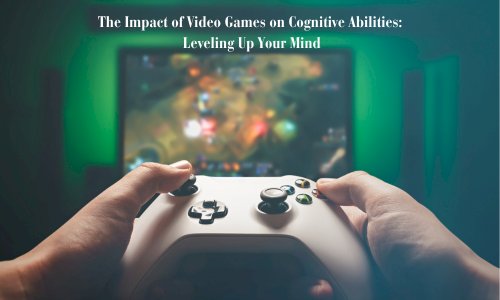The Impact of Video Games on Cognitive Abilities: Leveling Up Your Mind

In today's digital age, video games have become a prevalent form of entertainment for people of all ages. While concerns about their effects on cognitive abilities have been raised, recent research suggests that video games can actually have a positive impact on various aspects of our mental faculties. In this article, we will explore how video games can enhance cognitive abilities, sharpen critical thinking skills, improve problem-solving abilities, and foster creativity.
- Enhancing Cognitive Abilities
Contrary to popular belief, video games can be a catalyst for improving cognitive abilities. Studies have shown that certain types of video games, such as strategy and puzzle games, can enhance memory, attention span, and reaction time. These games often require players to think strategically, analyze situations, and make quick decisions, thereby stimulating their brain's executive functions.
- Sharpening Critical Thinking Skills
Video games often present players with complex challenges and puzzles that require critical thinking skills to overcome. For example, in role-playing games (RPGs), players must solve intricate quests, analyze character attributes, and strategize battles. These activities promote problem analysis, decision-making, and logical reasoning, all of which are essential components of critical thinking.
- Improving Problem-Solving Abilities
Video games are known for presenting players with a myriad of problems and obstacles to overcome. Whether it's navigating mazes, deciphering codes, or finding hidden objects, video games require players to employ problem-solving strategies. Engaging in such activities on a regular basis can enhance players' ability to approach problems from different angles, think creatively, and persevere until a solution is found.
- Fostering Creativity
Contrary to the perception that video games stifle creativity, many games actually encourage and foster imaginative thinking. Games with open-world environments, sandbox elements, or level editors provide players with the freedom to create and experiment. Players can build virtual worlds, design characters, or even compose music within the game's framework. This process stimulates creativity, as players are given the opportunity to explore and express their ideas in a dynamic and interactive way.
- Enhancing Multitasking Skills
Video games often require players to process information from multiple sources simultaneously. For instance, in action-packed games, players must keep track of their character's health, manage inventory, assess the environment, and respond to changing situations, all in real-time. This multitasking aspect of gaming can improve players' ability to handle multiple tasks efficiently and make quick decisions based on changing circumstances.
Video games, when approached in a balanced and mindful manner, can have a positive impact on cognitive abilities. They can enhance memory, attention span, critical thinking, problem-solving, and creativity. However, it's important to note that excessive gaming or neglecting other aspects of life can have adverse effects. Like any other form of entertainment, moderation is key.
Parents, educators, and gamers themselves should strive to find a healthy balance between gaming and other activities, such as physical exercise, social interactions, and academic pursuits. By doing so, video games can be an enjoyable and beneficial tool for expanding cognitive abilities, while still maintaining a well-rounded lifestyle.
So, the next time you embark on a gaming adventure, remember that you're not just having fun; you're also leveling up your mind!






























